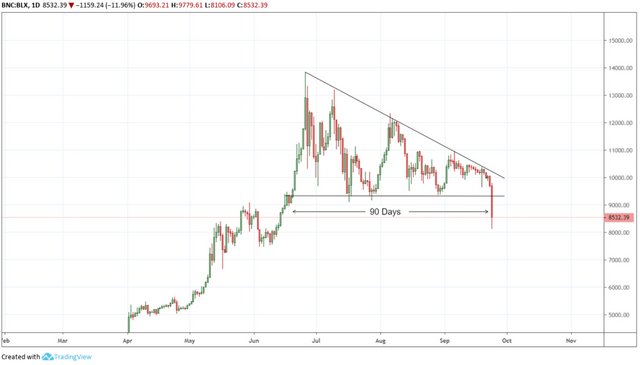Bitcoin Plunges After Underwhelming Bakkt Launch

As price plummeted, wide spreads opened on major exchanges, and unprepared traders searched for an explanation for the sudden volatility.
The move was anticipated by technical pattern traders like Peter Brandt, who warned of the likely bearish outcome of the descending triangle that the price has painted on the chart over the past 90 days.
Fundamental analysts have taken a different view, with some attributing the move to the lacklustre launch of Bakkt, which didn’t live up to the narrative that a regulated physically-backed futures product would spark instant unprecedented institutional demand for bitcoin.
Meanwhile, others link the drop in price to a sudden tumble in bitcoin's hash rate, and macroeconomic forces influencing the cryptoeconomy.
Lacklustre Bakkt launch
Since it was first announced in August 2018, Bakkt has generated significant hype, with traders anticipating that physically-backed futures with regulated custody would bring a new breed of institutional interest to the market.
But when the futures were launched on September 23rd, few traders took advantage — only five Bitcoin futures contracts were traded within the first hour, and only 28 within the first ten hours of operation.
This contrasts sharply with CME Bitcoin Futures, which launched quietly in December 2017 and attracted high trading volumes almost immediately.
Alex Mashinsky, CEO at crypto lending and depository company Celsius Network, suggests that physically-backed bitcoin futures might not be as appealing to institutions as previously thought.
"The disappointing BAKKT opening signals to the crypto community that institutions are less ready to invest in BTC at scale than was supposed, which means the price was probably too high and due for a correction," said Mashinsky to Brave New Coin. "What we've just seen is short sellers and momentum traders piling on to make things worse, and now here we are back at support."
Incidentally, institutions that were previously held back by cautious compliance departments might be unlikely to jump head first into a new product, even if it is regulated and operating under a trusted name like the NYSE.
Su Zhu, chief executive of Singaporean investment firm Three Arrows Capital, told Forbes that Bakkt will be slow to catch on, with investment likely to be "first a trickle and then a flood."
Other commentators agree that trading volume levels are likely to rise slowly. Economist and crypto pundit Alex Kruger says that despite market expectations big funds would walk straight in, now the door is open, they are more likely to "trickle" through.
Mining blips and macro economic forces
Along with the technical explanation of a descending triangle, and the underwhelming impact of Bakkt, other analysts have volunteered alternative reasons for the sudden drop.
A macro narrative has been slowly building over the last few years that bitcoin is growing more sensitive to geopolitical tensions and global economic events. Travis Kling, investment officer at Californian crypto asset firm Ikigai, suggests this drop is yet another example of macroeconomic forces impacting bitcoin.
He maintains that "global macro has a big effect on crypto", and that the move could be linked to the injection by the Federal Reserve of hundreds of billions of dollars into the financial system, and the skyrocketing of repurchase rates last week — the short-term funding rates that banks use to lend funds to each other which underpin the global economy.
"If you drop a big rock in the middle of a pond, how far do the ripples go?" asks Kling on Twitter.
Others point to events within the crypto economy, like the Bitcoin hash rate — which some suspect has a positive correlation with the Bitcoin price — and tumbled about 40 percent on September 23rd.
Just like the sudden drop in price, there is no widely accepted reason for the drop in hashrate, but it could be attributed to a sudden exodus of miners, or several mining pools disconnecting at the same time. Coincidentally, Squire Mining LTD announced in a recent press release that its extensive mining operations in Kazakhstan might suffer from a temporary loss of power.
